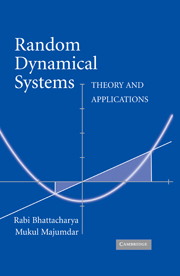Book contents
- Frontmatter
- Contents
- Preface
- Acknowledgment
- Notation
- 1 Dynamical Systems
- 2 Markov Processes
- 3 Random Dynamical Systems
- 4 Random Dynamical Systems: Special Structures
- 5 Invariant Distributions: Estimation and Computation
- 6 Discounted Dynamic Programming Under Uncertainty
- A Appendix
- Bibliography
- Author Index
- Subject Index
1 - Dynamical Systems
Published online by Cambridge University Press: 20 February 2010
- Frontmatter
- Contents
- Preface
- Acknowledgment
- Notation
- 1 Dynamical Systems
- 2 Markov Processes
- 3 Random Dynamical Systems
- 4 Random Dynamical Systems: Special Structures
- 5 Invariant Distributions: Estimation and Computation
- 6 Discounted Dynamic Programming Under Uncertainty
- A Appendix
- Bibliography
- Author Index
- Subject Index
Summary
Not only in research, but also in the everyday world of politics and economics, we would all be better off if more people realized that simple nonlinear systems do not necessarily possess simple dynamical properties.
Robert M. MayThere is nothing more to say – except why. But since why is difficult to handle, one must take refuge in how.
Toni MorrisonIntroduction
There is a rich literature on discrete time models in many disciplines – including economics – in which dynamic processes are described formally by first-order difference equations (see (2.1)). Studies of dynamic properties of such equations usually involve an appropriate definition of a steady state (viewed as a dynamic equilibrium) and conditions that guarantee its existence and local or global stability. Also of importance, particularly in economics following the lead of Samuelson (1947), have been the problems of comparative statics and dynamics: a systematic analysis of how the steady states or trajectories respond to changes in some parameter that affects the law of motion. While the dynamic properties of linear systems (see (4.1)) have long been well understood, relatively recent studies have emphasized that “the very simplest” nonlinear difference equations can exhibit “a wide spectrum of qualitative behavior,” from stable steady states, “through cascades of stable cycles, to a regime in which the behavior (although fully deterministic) is in many respects chaotic or indistinguishable from the sample functions of a random process” (May 1976, p. 459).
Information
- Type
- Chapter
- Information
- Random Dynamical SystemsTheory and Applications, pp. 1 - 118Publisher: Cambridge University PressPrint publication year: 2007
